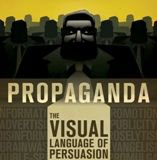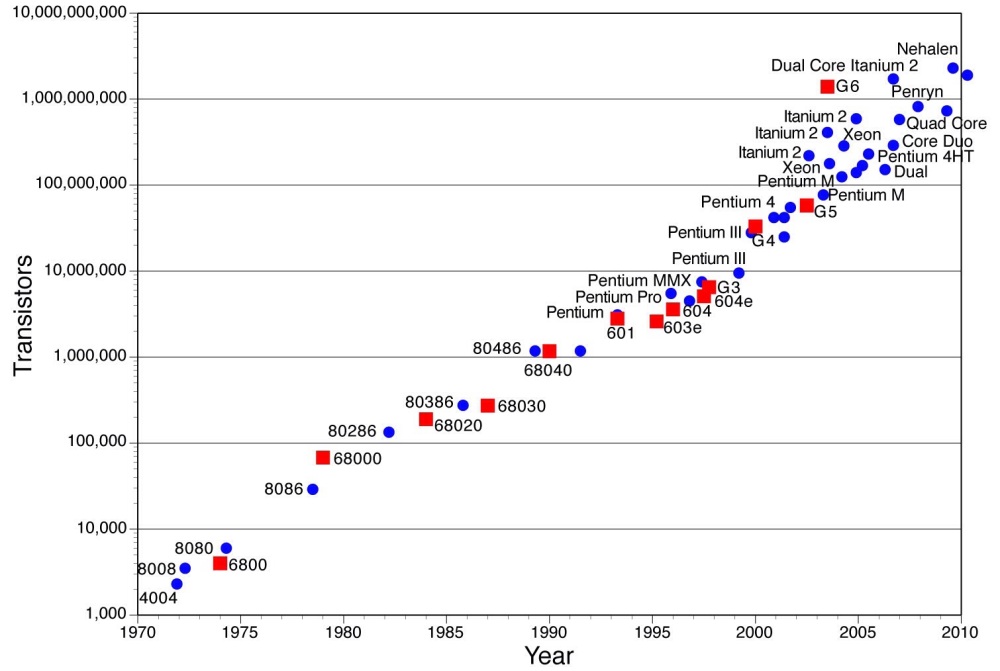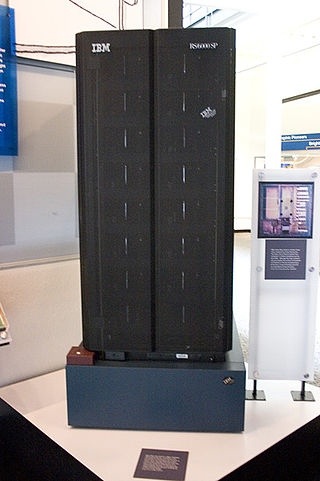Just finished reading a fascinating article about machine learning and at what point will computers be smarter and more able then human beings. The time is approaching quickly. Moores Law states computer processing ability doubles every two years.
“””””””Moore’s law is the observation that, over the history of computing hardware, the number of transistors on integrated circuits doubles approximately every two years. The law is named after Intel co-founder Gordon E. Moore, who described the trend in his 1965 paper.[1][2][3] His prediction has proven to be accurate, in part because the law is now used in the semiconductor industry to guide long-term planning and to set targets for research and development.[4]”””””””
This article is about Google and Ray Kurzweil. Specifically it is about the fact they have recently acquired some of the biggest firms in machine learning and Artificial Intelligence. It is reported they are working on the Manhattan Project of AI.
The article.
“””””””””””But then everyone’s allowed their theories. It’s just that Kurzweil’s theories have a habit of coming true. And, while he’s been a successful technologist and entrepreneur and invented devices that have changed our world – the first flatbed scanner, the first computer program that could recognise a typeface, the first text-to-speech synthesizer and dozens more – and has been an important and influential advocate of artificial intelligence and what it will mean, he has also always been a lone voice in, if not quite a wilderness, then in something other than the mainstream.
And now? Now, he works at Google. Ray Kurzweil who believes that we can live for ever and that computers will gain what looks like a lot like consciousness in a little over a decade is now Google’s director of engineering. The announcement of this, last year, was extraordinary enough. To people who work with tech or who are interested in tech and who are familiar with the idea that Kurzweil has popularised of “the singularity” – the moment in the future when men and machines will supposedly converge – and know him as either a brilliant maverick and visionary futurist, or a narcissistic crackpot obsessed with longevity, this was headline news in itself.
But it’s what came next that puts this into context. It’s since been revealed that Google has gone on an unprecedented shopping spree and is in the throes of assembling what looks like the greatest artificial intelligence laboratory on Earth; a laboratory designed to feast upon a resource of a kind that the world has never seen before: truly massive data. Our data. From the minutiae of our lives.
Google has bought almost every machine-learning and robotics company it can find, or at least, rates. It made headlines two months ago, when it bought Boston Dynamics, the firm that produces spectacular, terrifyingly life-like military robots, for an “undisclosed” but undoubtedly massive sum. It spent $3.2bn (£1.9bn) on smart thermostat maker Nest Labs. And this month, it bought the secretive and cutting-edge British artificial intelligence startup DeepMind for £242m.
And those are just the big deals. It also bought Bot & Dolly, Meka Robotics, Holomni, Redwood Robotics and Schaft, and another AI startup, DNNresearch. It hired Geoff Hinton, a British computer scientist who’s probably the world’s leading expert on neural networks. And it has embarked upon what one DeepMind investor told the technology publication Re/code two weeks ago was “a Manhattan project of AI”. If artificial intelligence was really possible, and if anybody could do it, he said, “this will be the team”. The future, in ways we can’t even begin to imagine, will be Google’s.
There are no “ifs” in Ray Kurzweil’s vocabulary, however, when I meet him in his new home – a high-rise luxury apartment block in downtown San Francisco that’s become an emblem for the city in this, its latest incarnation, the Age of Google. Kurzweil does not do ifs, or doubt, and he most especially doesn’t do self-doubt. Though he’s bemused about the fact that “for the first time in my life I have a job” and has moved from the east coast where his wife, Sonya, still lives, to take it.
Bill Gates calls him “the best person I know at predicting the future of artificial intelligence”. He’s received 19 honorary doctorates, and he’s been widely recognised as a genius. But he’s the sort of genius, it turns out, who’s not very good at boiling a kettle. He offers me a cup of coffee and when I accept he heads into the kitchen to make it, filling a kettle with water, putting a teaspoon of instant coffee into a cup, and then moments later, pouring the unboiled water on top of it. He stirs the undissolving lumps and I wonder whether to say anything but instead let him add almond milk – not eating diary is just one of his multiple dietary rules – and politely say thank you as he hands it to me. It is, by quite some way, the worst cup of coffee I have ever tasted.
But then, he has other things on his mind. The future, for starters. And what it will look like. He’s been making predictions about the future for years, ever since he realised that one of the key things about inventing successful new products was inventing them at the right moment, and “so, as an engineer, I collected a lot of data”. In 1990, he predicted that a computer would defeat a world chess champion by 1998. In 1997, IBM’s Deep Blue defeated Garry Kasparov. He predicted the explosion of the world wide web at a time it was only being used by a few academics and he predicted dozens and dozens of other things that have largely come true, or that will soon, such as that by the year 2000, robotic leg prostheses would allow paraplegics to walk (the US military is currently trialling an “Iron Man” suit) and “cybernetic chauffeurs” would be able to drive cars (which Google has more or less cracked).
His critics point out that not all his predictions have exactly panned out (no US company has reached a market capitalisation of more than $1 trillion; “bioengineered treatments” have yet to cure cancer). But in any case, the predictions aren’t the meat of his work, just a byproduct. They’re based on his belief that technology progresses exponentially (as is also the case in Moore’s law, which sees computers’ performance doubling every two years). But then you just have to dig out an old mobile phone to understand that. The problem, he says, is that humans don’t think about the future that way. “Our intuition is linear.”
When Kurzweil first started talking about the “singularity”, a conceit he borrowed from the science-fiction writer Vernor Vinge, he was dismissed as a fantasist. He has been saying for years that he believes that the Turing test – the moment at which a computer will exhibit intelligent behaviour equivalent to, or indistinguishable from, that of a human – will be passed in 2029. The difference is that when he began saying it, the fax machine hadn’t been invented. But now, well… it’s another story.”””””””””””
Further
“”””””””””””But then he predicts that by 2045 computers will be a billion times more powerful than all of the human brains on Earth. And the characters’ creation of an avatar of a dead person based on their writings, in Jonze’s film, is an idea that he’s been banging on about for years. He’s gathered all of his father’s writings and ephemera in an archive and believes it will be possible to retro-engineer him at some point in the future.
So far, so sci-fi. Except that Kurzweil’s new home isn’t some futuristic MegaCorp intent on world domination. It’s not Skynet. Or, maybe it is, but we largely still think of it as that helpful search engine with the cool design. Kurzweil has worked with Google’s co-founder Larry Page on special projects over several years. “And I’d been having ongoing conversations with him about artificial intelligence and what Google is doing and what I was trying to do. And basically he said, ‘Do it here. We’ll give you the independence you’ve had with your own company, but you’ll have these Google-scale resources.'”
And it’s the Google-scale resources that are beyond anything the world has seen before. Such as the huge data sets that result from 1 billion people using Google ever single day. And the Google knowledge graph, which consists of 800m concepts and the billions of relationships between them. This is already a neural network, a massive, distributed global “brain”. Can it learn? Can it think? It’s what some of the smartest people on the planet are working on next.
Peter Norvig, Google’s research director, said recently that the company employs “less than 50% but certainly more than 5%” of the world’s leading experts on machine learning. And that was before it bought DeepMind which, it should be noted, agreed to the deal with the proviso that Google set up an ethics board to look at the question of what machine learning will actually mean when it’s in the hands of what has become the most powerful company on the planet. Of what machine learning might look like when the machines have learned to make their own decisions. Or gained, what we humans call “consciousness”
I first saw Boston Dynamics’ robots in action at a presentation at the Singularity University, the university that Ray Kurzweil co-founded and that Google helped fund and which is devoted to exploring exponential technologies. And it was the Singularity University’s own robotics faculty member Dan Barry who sounded a note of alarm about what the technology might mean: “I don’t see any end point here,” he said when talking about the use of military robots. “At some point humans aren’t going to be fast enough. So what you do is that you make them autonomous. And where does that end? Terminator?”
And the woman who headed the Defence Advanced Research Projects Agency (Darpa), the secretive US military agency that funded the development of BigDog? Regina Dugan. Guess where she works now?
Kurzweil’s job description consists of a one-line brief. “I don’t have a 20-page packet of instructions,” he says. “I have a one-sentence spec. Which is to help bring natural language understanding to Google. And how they do that is up to me.”
Language, he believes, is the key to everything. “And my project is ultimately to base search on really understanding what the language means. When you write an article you’re not creating an interesting collection of words. You have something to say and Google is devoted to intelligently organising and processing the world’s information. The message in your article is information, and the computers are not picking up on that. So we would like to actually have the computers read. We want them to read everything on the web and every page of every book, then be able to engage an intelligent dialogue with the user to be able to answer their questions.”””””””””
Guardian article on Google, Kurzweil and AI
Fascinating
I think this article raises interesting questions. Are we morally at a point when we can deal with the consequences of machines being smarter and more able then we are. Who is going make these decisions? Will computers at some point decide they no longer need humanity? At what point does a company such as google become too powerful? In many ways are we playing god and designing things that will be so far superior to humans that it does away with the very things that make is human? I could go on and on with hypothetical questions. This is such an amazingly interesting subject.
Kasparov vs Big Blue
“””””””””””Deep Blue versus Garry Kasparov was a pair of famous six-game human–computer chess matches, in the format of machine and humans, versus a human. In this format, on the machine side a team of chess experts and programmers manually alter engineering between the games.
The matches were played between the IBM supercomputer Deep Blue with a team of IBM programmers and chess experts who directed and reprogrammed the machine between games on the one side, and the World Chess Champion Garry Kasparov on the other side.
The first match was played in February 1996 in Philadelphia, Pennsylvania. Kasparov won the match 4–2, losing one game, drawing in two and winning three.
A rematch was played in 1997 – this time Deep Blue won 3½–2½.”””””””
Wikipedia entry and matches between Kasparov and Big Blue
A .pdf “How much longer can Man match the machine”.



Superb website.Considerably because of once more. Great.
LikeLike
How long before computers are smarter than humans ? | drakeequation
LikeLike
This is very interesting, You’re a very skilled blogger. I have joined your feed and look forward to seeking more of your great post. Also, I have shared your site in my social networks!
LikeLike